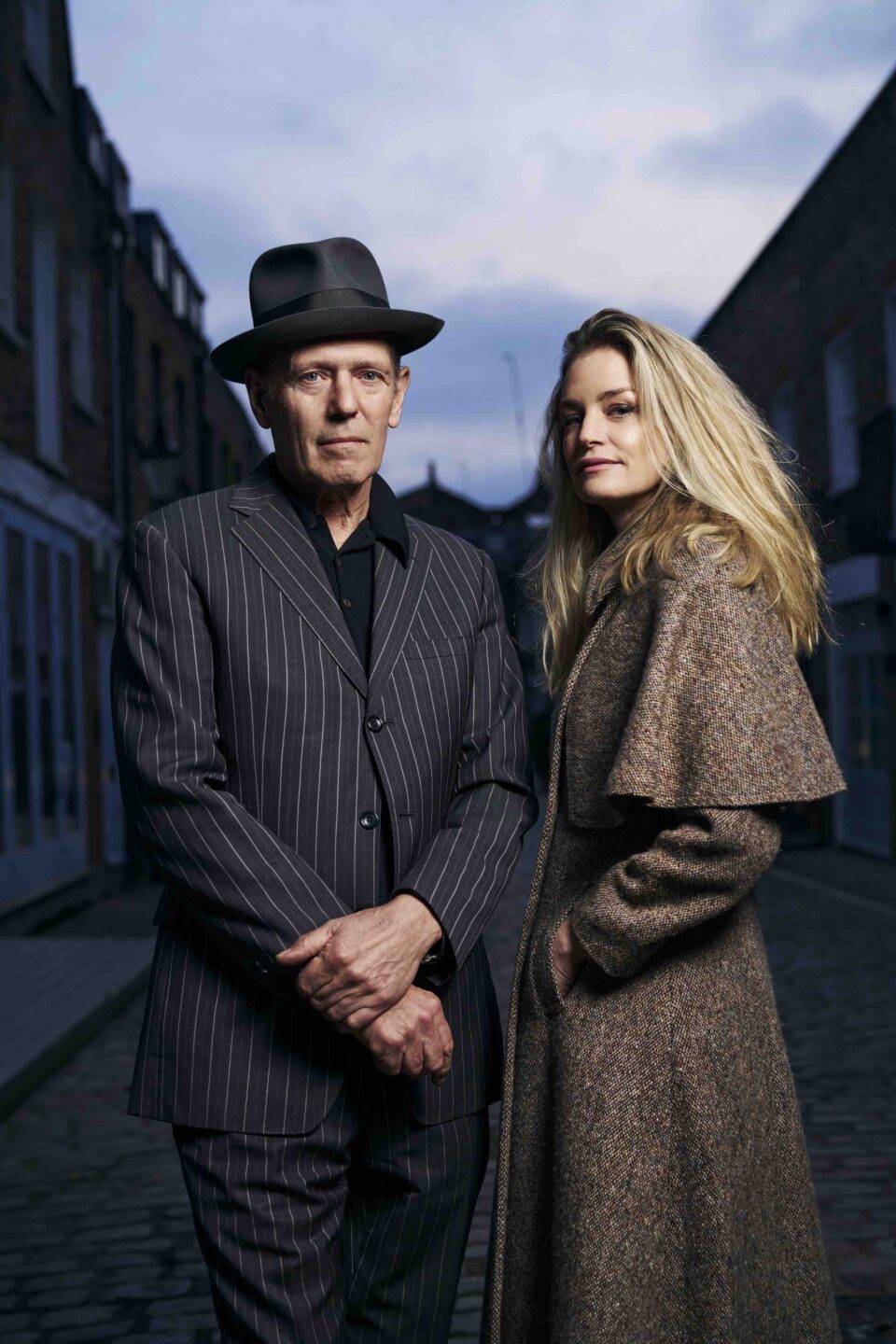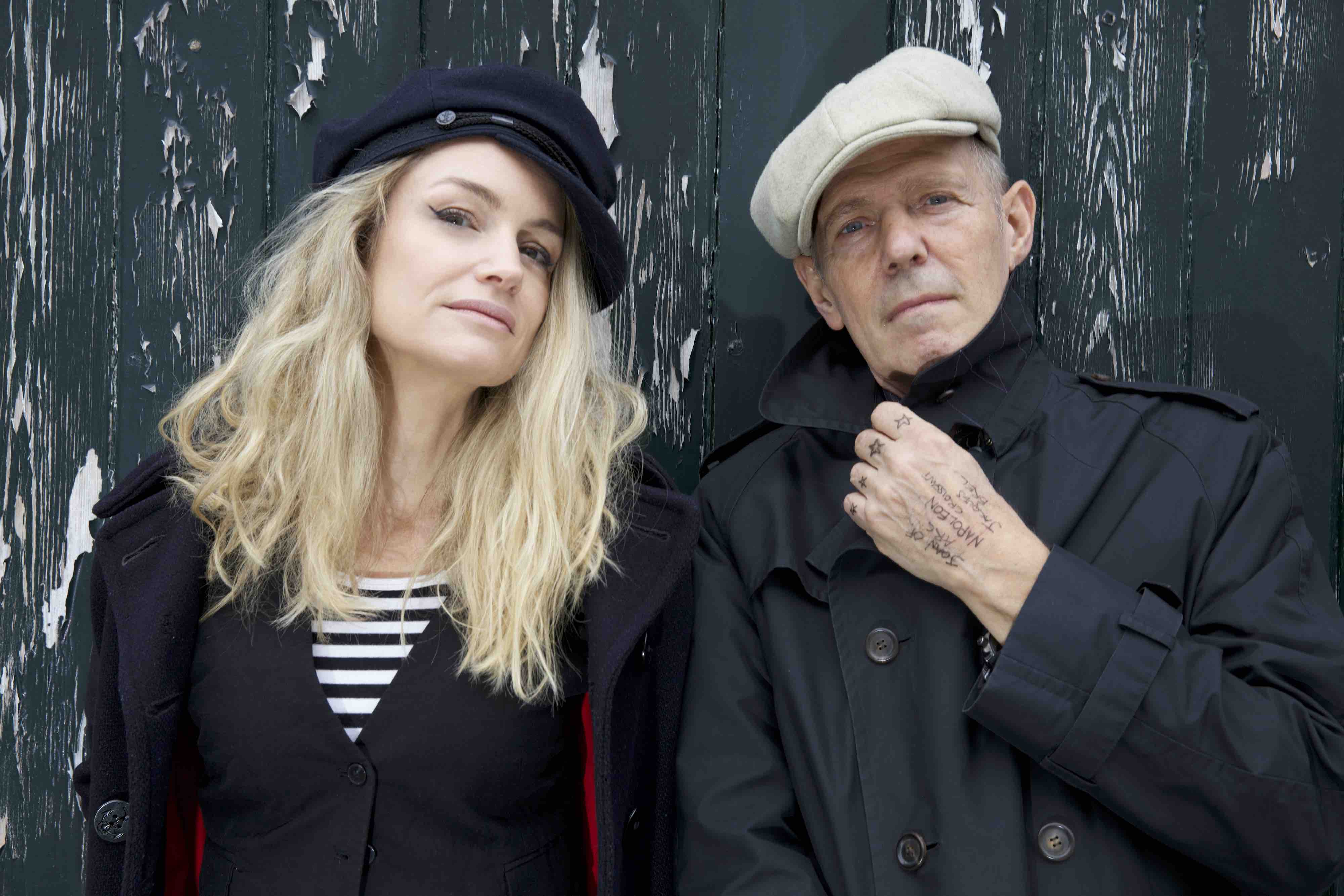This year isn’t even halfway over, but the odds-on favorite for Most Charming Album of 2023 is on the cusp of release. Can We Do Tomorrow Another Day? by Galen & Paul—singer-songwriter Galen Ayers and founding Clash bassist Paul Simonon—is the tuneful soundtrack to the European summer vacation you wish you could have, a sun-baked, wine-sozzled affair where even the darkest moments are suffused with splashes of wry humor.
Songs like “Never Had a Good Time in Paris,” “Lonely Town,” and “It’s Another Night” find the pair duetting in flirtatious Nancy Sinatra-Lee Hazlewood mode, while more world-weary numbers like “The Lighthouse Waltz” and the Spanish-sung “Esmerelda” and “Hacia Arriba” have a winning warmth underlying the surface sorrow. “Room at the Top” brings an almost Addams Family–like comic-horror element to the album, while “A Sea Shanty” is a melodica-driven pirate goof and “Mi Camino” pays tribute to 1960s French girl-pop…in Spanish.
That it all works so wonderfully is a testament to the playful personalities of Ayers and Simonon, the sharpness of their respective songwriting, and the production of Tony Visconti, who superbly captured the loose, predominantly acoustic feel that Simonon envisioned for the project. Galen & Paul’s band on the album also features keyboardist Dan Donovan (Big Audio Dynamite), bassist Simon Tong (The Verve), and drummer Sebastian Rochford (Polar Bear), while Simonon and Tong’s old The Good, The Bad & The Queen bandmate Damon Albarn plays melodica on several tracks.
We spoke with Galen & Paul over Zoom from Simonon’s London home—the same one that inspired “Room at the Top”—and got the lowdown on the making of the album, the influences behind its songs, and Simonon’s culinary specialties.
What brought the two of you together in the first place?
Galen Ayers: A love of chili—not the country, the spice [laughs].
Paul Simonon: Well, the country could be, too. But we’ve got lots of friends in common, and we’ve known each other for quite a while. She was thinking of making an album, and I said, “Well, have you got a guitar?” And she said, “No.” So next day I gave her a guitar and I played a few of the songs that I’d already had, just to see what she thought. And pretty much it just clicked. Initially, my thoughts were that it’d be really great to have a female voice to sing my songs, but then Galen was saying, “Yeah, but you’ve got to sing as well.”
Galen: I fell in love with his voice, and then we very quickly really enjoyed our voices together. One of the things that drew me to the songs was that he already had the idea of putting the Spanish into some of them. And I had played around with singing in Spanish, but I’ve never done a deep dive into it, so this just gave me a real chance to do that. One of the parameters that we set very early on was that we had to do something that neither of us had done before—to allow for a third thing to happen, which is what you hear. It’s not something either of us could have done alone.
“One of the parameters that we set very early on was that we had to do something that neither of us had done before… It’s not something either of us could have done alone.” — Galen Ayers
Did the two of you pool your songs that were already written for the album, or did you write some of them together as well?
Galen: It was definitely a three-part album in the sense that I had a bunch of songs, Paul did too; and then, as we got to know each other and we kind of got excited about our musical abilities together and the different choices we had, we were able to create songs together.
Paul: The way we are with each other, if we did come to an issue about something, we’d discuss it in an adult way. And then what sometimes happens is, you actually create a “third way” that none of us even thought of.
Galen: Paul’s a great cook, so while he was cooking dinner we’d have the songs playing, and we really were strict about tearing the fat out of it. Even if we loved a bit, collectively or individually, we were not precious about keeping it.

“If we did come to an issue about something, we’d discuss it in an adult way. What sometimes happens is you actually create a ‘third way’ that none of us even thought of.” — Paul Simonon
Were there any previous duet pairings that particularly inspired you?
Paul: When we were listening back, it did make us think of Lee Hazlewood and Nancy Sinatra. But because we’d spent a lot of time together, we’d developed a natural banter. “Never Had a Good Time in Paris” is a very good example, because the end part was not scripted; it was just us bouncing off each other casually, you know, being—
Galen: Being silly [laughs].
You worked with Tony Visconti on this record. Tony’s a legendary producer, obviously, but what did he bring to this particular project?
Galen: When I met him, right away we had Tibetan Buddhism in common—I’ve studied it, and he’s practiced it for years—so that kind of makes you feel like you’re with your tribe. In terms of musicality, it’s good to have a referee to kind of bounce ideas around with. But Tony’s also just so hardworking in a non-tense way, which I think comes from doing, what, 1,200 albums? He caught COVID the second day here, but he still figured out a way to work on the record remotely. And he loved the songs; I mean, that was one of the things that gave us confidence.
Paul: I’d sent him a few demos, and he said, “Paul, I really want to make this record.” I’ve worked with him before, and I like his attitude. It’s like, “I’m here to help you make the record you want to make.”
“It’s like I said to Tony Visconti, ‘I don’t want to smell any technology on this record. I want to hear humans at work.’” — Paul Simonon
The record feels very laid-back. Is that a good indication of what the recording sessions were like?
Paul: Yeah, it just all happened organically. Two of the songs that made the record, we’d written just a week or two before we went into the recording studio. It’s like I said to Tony, “I don’t want to smell any technology on this record. I want to hear humans at work.”
Galen: And maybe in hindsight, that’s one of the things that strikes a chord with people, especially as we’re coming out of the isolation we were in due to COVID. There’s this kind of feeling of a group of friends getting together and celebrating music rather than machines or AI taking over.
What inspired “Room at the Top”? It’s a really whimsical song, but it’s also kind of creepy at the same time.
Paul: It was really started by a conversation with Dan Donovan. I’m really into Del Shannon, and I love that sound of the keyboard on his songs like “Runaway” and “Hats Off to Larry.” I said to Dan, “If you find that sound, then we’ll write a song for it.” And he said it was a one-off instrument [a Musitron], so he borrowed Damon [Albarn]’s Farfisa that was found in the back of a store in Florence, Italy, and the sound was right. So in a way you could say it was written for Del Shannon to sing. But then the lyrics are also sort of tinged with objects that I’ve got around the room. I mean, if I turn [the screen] around, you’ll see there’s a painting on the wall with a curtain over it, and there’s a skeleton in the room…
Galen: When we were rehearsing the song, my other name for it was “The Furniture Song,” because you have to remember so many different bloody bits of furniture.
I just assumed the song was about a haunted house—but it turns out to be Paul’s pad.
Galen: Which could also be a haunted house. I mean, it’s not out of the question.
Paul: Well, it’s haunted by my belongings.
Galen: And it’s haunted by Paul [laughs].
Speaking of cool keyboard sounds, I love “A Sea Shanty,” which has that Augustus Pablo kind of melodica thing happening.
Paul: When I was writing the song, the thing that came to mind was a squeeze box, like they used on ships in the British navy. So the melodica was a good nod to that—and it was nice to get Damon to do a guest bit as a session musician.
Galen: Yeah, that was an interesting dynamic. I’ve been listening to Augustus Pablo a lot, because I’m learning the melodica. You can get such a yearning sound out of it, like a voice; it’s really evocative. I’m really enjoying getting to know it.
“I honestly don’t understand how people survive without having a creative outlet… I feel very lucky to have music.” — Galen Ayers
It’s a surprisingly challenging instrument to play, considering it looks almost like a toy.
Galen: Right—you’re almost embarrassed to bring it on stage. But actually it really packs a punch; and obviously Damon uses it to great effect on the Gorillaz records.
For those who don’t speak Spanish, what’s the song “Hacia Arriba” about?
Galen: Well, I’m going through a divorce, and the song is kind of a reminder to myself to keep looking upward and forward. There’s a mourning kind of thing to it, but it’s also reclaiming that energy of life. To be able to transmute suffering into music. I honestly don’t understand how people survive without having a creative outlet. I know people do, and there are many different ways to work through these things, but I feel very lucky to have music.
What about “Mi Camino”?
Galen: When I’m singing “Mi Camino,” I always feel like I’m this little girl running around with pigtails in the little hills around Spain where I grew up. All my childhood memories are steeped in music, with my dad [singer-songwriter Kevin Ayers] and everything. But even when I was alone, I was always singing like, “Hello, birds! Hello, bees! Hello, flowers!”
Paul: Yeah, sort of like the French yé-yé girls of the ’60s—France Gall and Jacqueline Taïeb.
Galen: We wanted to recreate that with slightly deeper lyrics than talking about lollipops or something. So it was just trying to combine something meaningful in a light way. The whole album, even when it’s steeped in sadness, I think we manage somehow to still stay light.
So, Paul, Galen says you’re a great cook—what’s your kitchen specialty?
Paul: Well, I’ve got a few. I can make paella, I can do spaghetti vongole. Majorcan fish soup is a good one.
Galen: I’m telling you, his vongole pasta is up there with my last meals—like, Desert Island meals. It’s just one of those simple dishes that you can get really wrong. It’s kind of like with music—people want to think they’re good cooks, so they add more and more stuff, and that takes away from the simplicity of it, the freshness of it. But Paul’s vongole is absolutely perfect! FL







